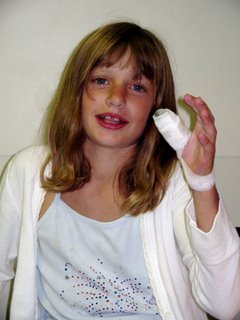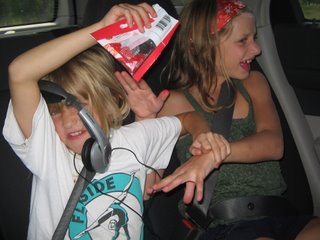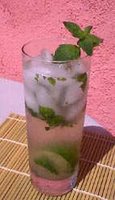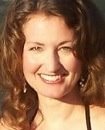
I woke up this morning to find that Jeff Meyerson had left a comment on an old blog entry (
Sam's Secrets Revealed, May 4, 2006.) I started to reply to it in the comments section, but when I couldn't stop writing I decided to post it here.
Thanks, Jeff. As much as I love to dive into the information about autism that comes from books and docs and therapists, the best support and ideas invariably come from other parents and family members in this same predictably wobbly boat. We keep each other sane.
Jeff Meyerson said...
K - that is great (and thanks for letting us in on your blog).
There are a lot of similarities (and a few differences) between Sam & my 6 year old nephew, C.J.
When a 5 year old names the entire list of dinosaurs in an A-Z book from memory, some of them 15-20 letters long that you would have trouble pronouncing, you can't help but take notice.
He's also into: computers and computer games, counting in many foreign languages, trains, natural sciences (my sister has to keep getting him non fiction books from the library) and, it seems, something new every day.
And he's much better at relating to others than even a year ago.{{{Jeff!}}}
I love these little guys.
It's amazing how kids with autism often have such similar interests and tendencies, but then there is also the saying that if you've met one child with autism, then you've met... one child with autism. They each have their own distinctive quirks and strengths and challenges, and these differences are often what confuse some of the -- hm, how shall I say this? -- less than ideal teachers. You know, the ones who say things like, "Oh, his problems are behavioral! He can't be autistic; he just made eye contact/told a joke/wrote a sentence." Many people still think of autism in the Kanner's Syndrome context only; non-verbal and rocking alone in a corner.
Ahem. Spectrum Disorder, people.
So many labels - Asperger's Syndrome, Non-Verbal Learning Disability, Pervasive Developmental Disorder, Not Otherwise Specifed (PDD-NOS - say
that three times fast), Kanner's Syndrome, Classic Autism.
If a child is evaluated by ten different professionals, he is likely to get ten different diagnoses. Internationally respected autism expert
Tony Attwood (my hero) is in favor of doing away with all the labels and replacing them with one: Autism Spectrum Disorder (ASD.) The labels are confusing and misleading, and interpreted differently by different people. In a seminar he led several years ago, he spoke of all the different names all used to describe the same syndrome and the confusion that often results from this. He rattled them off and said "Many people ask me to define the differences between all these terms." Then, very dramatically, he said "and today you will learn... that the difference is..." (drumroll...) "the way they are spelled."
All the same thing. Just different levels of severity and functioning.
Jeff, Sam has also gone through most of the non-fiction books in the school library (many of them more than once) but he finally discovered fiction this year (4th grade) when he was introduced to the "Amber Brown" series. He made great strides in reading comprehension this year, thanks to a wonderful teacher and lots of patience from his first-rate 1:1 aide and all of his therapists. These guys do make progress, just at their own pace.
Sam has cycled through many areas of extreme special interest, including:
1) Trains (which, I'm sure, will forever be his first love. He got to
drive(!) The Monorail at Disney World a couple of years ago. I'll never forget the look on his face. He was in his Happy Place.)
2) Shipwrecks (oh man, you wouldn't believe how many incredibly detailed Titanic pictures I have scattered around the house)
3) Tornadoes ("Mom, can we move to Tornado Alley?")
4) Computers (would stay on it all day if I didn't drag him away. Apple. Doesn't. Fall. Far.)
5) Rollercoasters (he has designed very elaborate and sophisticated rides on his computer)
6) Maps (he can tell me, in detail, exactly how to drive from Massachusetts to Michigan including highway names, landmarks, and time required to get from Point A to Point B)
7) Baseball (he's totally distracted while out in the field, but can slam the cover off the ball)
8) Drawing (his renditions of the SpongeBob characters are downright professional)
9) Weather (his school has a weather station and next year he'll get to work there if he wants to)
People with ASD are more successful in life if they can channel one or more of their interests into a career. This seems obvious, but often, they are steered away from these interests because they are so intensely obsessive about them, to the exclusion of other things. We have had great success when Sam's teachers have incorporated his preferred topics into his school day, either using special activities as a reward for getting his regular work done, or by allowing him to incorporate one of his interests into an assigned project, such as a social studies project or book report.
For example, his 4th grade teacher worked out a system where Sam was allowed to teach an art lesson every Friday. His classmates loved watching him demonstrate his cartoon-drawing skills, he got a huge self-esteem and social skills boost, and it provided much needed motivation to get his regular work done throughout the week. The year prior to that, he had a teacher who was very annoyed by this distraction, and took away his drawings with a huff and a stern look without trying to channel this strong skill into an effective learning system. That was a very bad year.
These little guys have so much potential. If they are surrounded by adults who understand that an octagonal peg will never fit into a triangular hole, they can achieve amazing things.
Sam's courage inspires me. He faces sensory, social, language, and cognitive challenges every day while doing things that the rest of us can do on autopilot. When he is in situations where the grownups in charge understand that they need to support him instead of fix him, he flourishes.
 UPDATE #1: Abby's doing fine, though still wearing the splint. She has a nasty, horrible bruise on her left thumb knuckle, and she lost so much skin that my knees buckle a little bit every time I change the bandage.
UPDATE #1: Abby's doing fine, though still wearing the splint. She has a nasty, horrible bruise on her left thumb knuckle, and she lost so much skin that my knees buckle a little bit every time I change the bandage.








